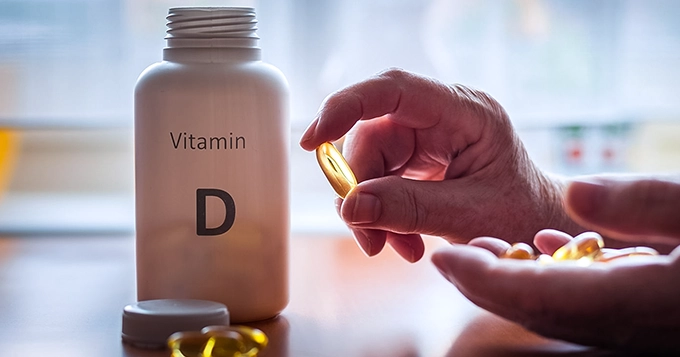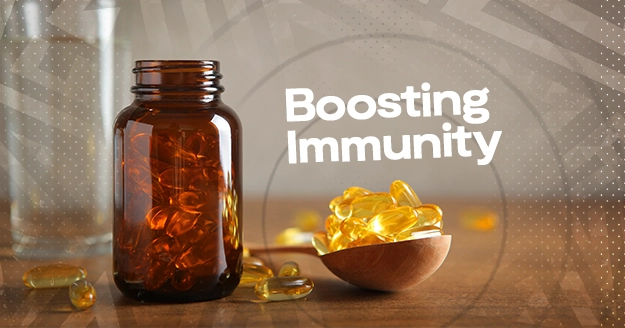What is Vitamin D?
We consume vitamin D as a nutrient we get from food and supplements, but our bodies also produce it as a hormone. It is a fat-soluble vitamin with a long history of helping the body retain and absorb calcium and phosphorus, both of which are needed for bone development.
Vitamin D2 and vitamin D3 are the two main types. The majority of vitamin D2 is produced by humans and added to food, whereas humans produce vitamin D3 in their skin, which is also ingested through the consumption of animal-based foods.
In this article, we’ll talk about vitamin D and immune function.
Sources of Vitamin D
-
Sunlight
Our own skin’s production of vitamin D serves as the body’s main supply of the vitamin. During exposure to sunlight, 7-dehydrocholesterol in the skin absorbs UV B radiation and is converted to vitamin D3 which in turn isomerizes into vitamin D3.
-
Vitamin D supplements
Vitamin D supplements are also available in your pharmacies. However, supplementing with excessive amounts of vitamin D can be dangerous. When taking way beyond 4,000 IU of vitamin D per day, children and adults over the age of nine, pregnant women, and nursing mothers can experience:
- Nausea and vomiting
- Loss of weight and poor appetite
- Constipation
- Cardiac rhythm issues
- Kidney damage
- Disorientation and confusion
- Weakness
- Foods
Fatty fish. Mackerel and trout are just a few examples of fatty fish that are great sources of vitamin D.
Cod liver oil. Cod liver oil contains about 450 IU of Vitamin D per teaspoon or 5mL. Cod liver oil has been used for years to treat vitamin D deficiency.
Egg yolks. Eggs are an accessible and convenient source of vitamin D. They are frequently used in recipes for breakfast, lunch, dinner, and dessert. Use the entire egg, not just the whites, because the yolk is where an egg gets its vitamin D from.
Mushrooms. Due to their exposure to UV light, some wild mushrooms like chanterelles and morels are fantastic providers of vitamin D2.
Vitamin D-fortified foods. Unless it has been added, vitamin D is rarely found in foods (fortification is the process of adding nutrients to food). Thus, milk, yogurt, orange juice, and cereal are frequently fortified with vitamin D.
Can Vitamin D boost the immune system?
Yes. Through vitamin D immune system gets boosted. How?
The active form of vitamin D increases the production of microbe-fighting proteins in immune cells while also reduces the harmful inflammatory response of some white blood cells.
Another piece of evidence showing that vitamin D and immune system are connected is the observation that children with vitamin D deficiency rickets are more prone to develop respiratory infections, but kids who get enough sun seem to get less sick with them.
Also, adults with low vitamin D levels are more susceptible to colds, coughs, and upper respiratory tract infections.
Lastly, infections and autoimmune conditions such as inflammatory bowel disease, rheumatoid arthritis, and type 1 diabetes may be more common in people with inadequate vitamin D levels.
How much Vitamin D is needed to boost immunity?
For people under the age of 70, the Institute of Medicine has set the recommended daily amount (RDA) for vitamin D at 600 international units (IU) and at 800 IU.
According to some experts, people need significantly more vitamin D. For instance, according to the Endocrine Society, most persons aged 19 and older should consume 400 to 1000 International Units (IU) of vitamin D daily, either through food or supplements (the optimal consumption varies by age and sex).
Other Benefits of Vitamin D
- Vitamin D can reduce depression and regulate mood.
In one study, it was discovered that those who took vitamin D supplements and reported having negative feelings had an improvement in their symptoms. People with depression who are also vitamin D deficient may benefit from vitamin D supplements.
- Some evidence shows that vitamin D can support weight loss.
In one study, obese individuals who got vitamin D supplements in addition to adhering to a diet plan for weight loss lost more weight and fat mass than those in the placebo group who only followed the diet plan.
- Decreases the chance of heart disease.
Low vitamin D levels have been associated with a higher risk of heart issues such as heart failure, hypertension, and stroke. However, it’s not clear if a vitamin D deficit causes heart disease or only shows poor health when you have a chronic illness.
- Reduces the risk of multiple sclerosis (MS).
Deficiency or low vitamin D levels have been associated with an increased risk of MS, based on a 2018 assessment of population-based research.








